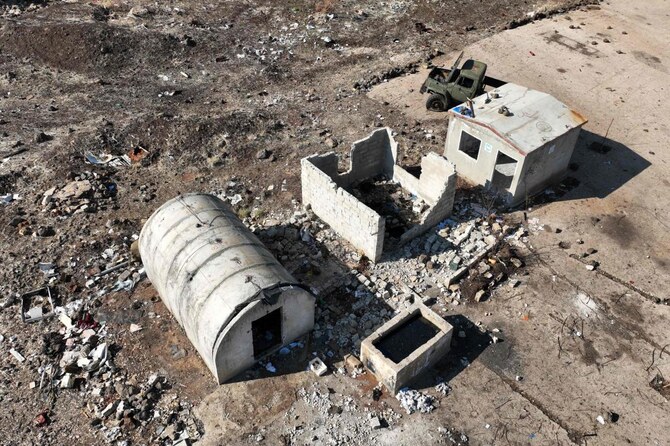JERUSALEM: Israel has helped a former soldier leave Brazil after legal action was initiated against him by a group accusing Israelis of war crimes in the Gaza Strip based in part on soldiers’ social media posts.
Israel’s Foreign Ministry on Sunday said it had helped the former soldier safely leave Brazil on a commercial flight after what it described as “anti-Israel elements” sought an investigation last week. It warned Israelis against posting on social media about their military service.
The Hind Rajab Foundation, named for a 5-year-old Palestinian girl killed in Gaza, said Brazilian authorities had launched an investigation into the soldier after it filed a complaint based on video footage, geolocation data and photographs showing him taking part in the demolition of civilian homes.
The foundation described the move as a “pivotal step toward accountability for crimes committed in Gaza” during nearly 15 months of war.
There was no immediate comment from Brazilian authorities. Brazilian media reported Saturday that the investigation was ordered by an on-call federal judge in Brazil’s Federal District. The decision was issued on Dec. 30 but first reported over the weekend.
Israel has faced heavy international criticism over its war against Hamas in Gaza, with the International Criminal Court issuing arrest warrants for Prime Minister Benjamin Netanyahu and his former defense minister. The International Court of Justice is separately investigating genocide allegations.
The Brazil case raised the prospect that rank-and-file Israeli troops could also face prosecution while traveling abroad.
Israel adamantly rejects the international allegations, saying its forces in Gaza are acting in accordance with international law and that any violations are punished within its judicial systems. It blames Hamas for civilian deaths, saying the militant group conceals tunnels and other infrastructure in residential buildings, necessitating their demolition.
Throughout the war, Israeli soldiers have posted numerous videos from Gaza that appear to show them rummaging through homes and blowing up or burning residential buildings. In some, they chant racist slogans or boast about destroying the Palestinian territory.
The military has pledged to take disciplinary action in what it says are a handful of isolated cases.
The war began when Hamas-led militants stormed into southern Israel on Oct. 7, 2023, killing some 1,200 people, mostly civilians, and abducting around 250. Some 100 hostages are still inside Gaza, at least a third believed to be dead.
Israel’s offensive has killed over 45,800 Palestinians in Gaza, according to local health officials. They say women and children make up over half the dead but do not distinguish between civilians and militants. Israel says it has killed over 17,000 militants, without providing evidence.
Israeli airstrikes on Sunday killed five people in the Nuseirat refugee camp in central Gaza and four in the southern city of Khan Younis, according to health workers. Gaza’s Health Ministry said at least 88 people had been killed in the past 24 hours.
The war has caused widespread destruction in Gaza and displaced around 90 percent of the population of 2.3 million people, with many forced to flee multiple times.
Israeli forces kill Palestinian security member
In the Israeli-occupied West Bank, Israeli forces killed a member of the Palestinian security services, calling him a wanted militant.
Israel’s paramilitary Border Police said Sunday they carried out an operation in Meithaloun village overnight to arrest Hassan Rabaiya. They said he was killed in a shootout while trying to escape.
Israeli authorities released helmet-cam footage that showed the police shooting the suspect and blowing up what police said was an explosives lab in his home.
The Palestinian security services identified Rabaiya as a first lieutenant in its Preventive Security force, saying he was killed while “performing his national duty.”
Meithaloun is near the West Bank city of Jenin, an epicenter of Israeli-Palestinian violence in recent years. The Palestinian Authority has been waging a rare crackdown on militants in Jenin, angering many Palestinians.
The internationally recognized Palestinian Authority exercises limited autonomy in parts of the West Bank and cooperates with Israel on security matters. But Israel has long accused it of inciting violence and turning a blind eye to militants, while Palestinian critics view it as a corrupt and ineffective body that aids the occupation.
The West Bank has seen a surge of violence during the war in Gaza. Israel captured both Gaza and the West Bank, as well as east Jerusalem, in the 1967 Mideast war, and the Palestinians want all three territories for their future state.
Israel warns that ceasefire in Lebanon is at risk
Israel’s defense minister warned Sunday that the truce that ended more than a year of fighting with Lebanon’s Hezbollah is at risk.
Israel Katz said the agreement requires Hezbollah to withdraw to the north of the Litani River and Lebanese troops to eliminate militant infrastructure in the buffer zone — “something that hasn’t happened yet.”
“If this condition is not met, there will be no agreement, and Israel will be forced to act on its own to ensure the safe return of the residents of (Israel’s) north to their homes,” he said.
Both sides have accused the other of violating the ceasefire agreement. Israel has withdrawn from just two of the dozens of towns it holds in southern Lebanon. And it has continued striking what it calls Hezbollah targets, accusing the militant group of attempting to launch rockets and move weapons before they can be confiscated and destroyed.
The deal struck on Nov. 27 required Hezbollah to immediately lay down its arms in southern Lebanon. It gave Israel 60 days to withdraw its forces and hand over control to the Lebanese army and UN peacekeepers.
Hezbollah, severely degraded after Israeli strikes, has threatened to resume fighting if Israel does not fully withdraw its forces by the 60-day deadline.



























